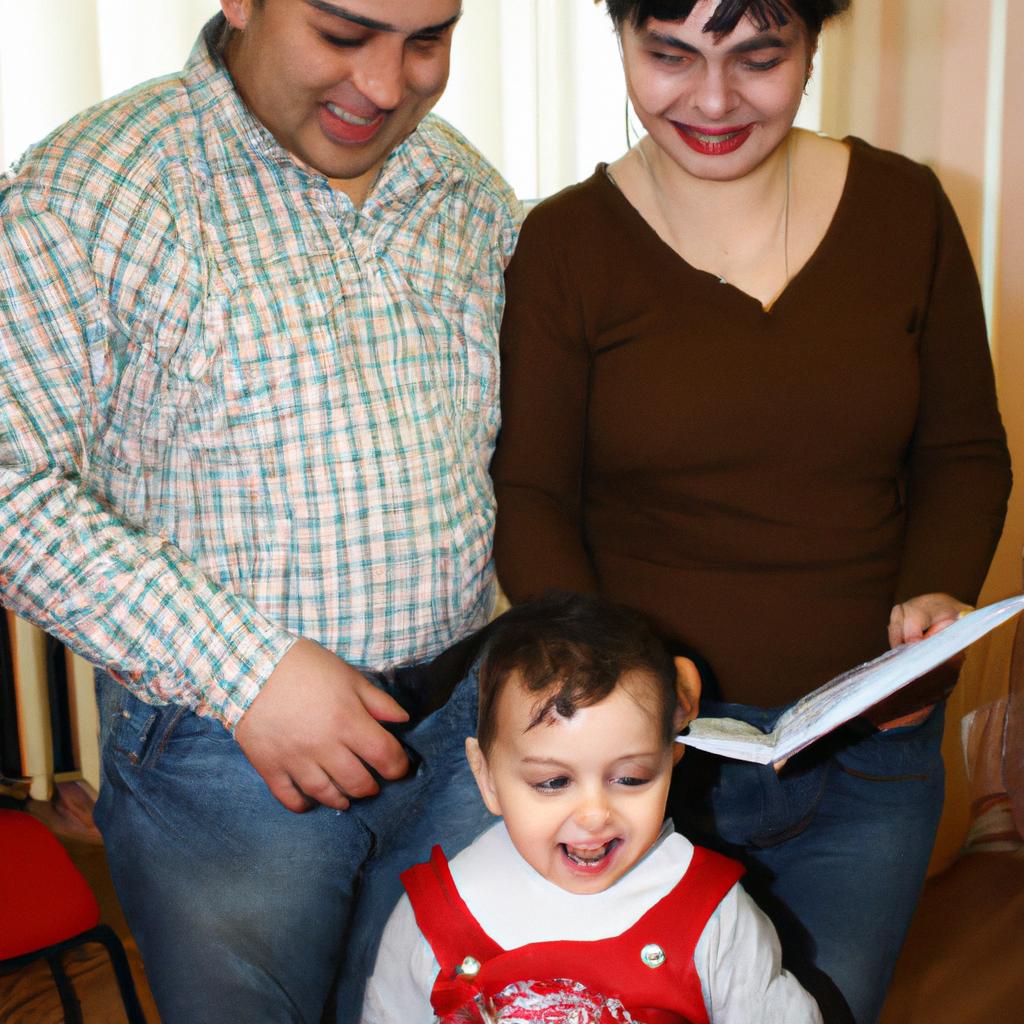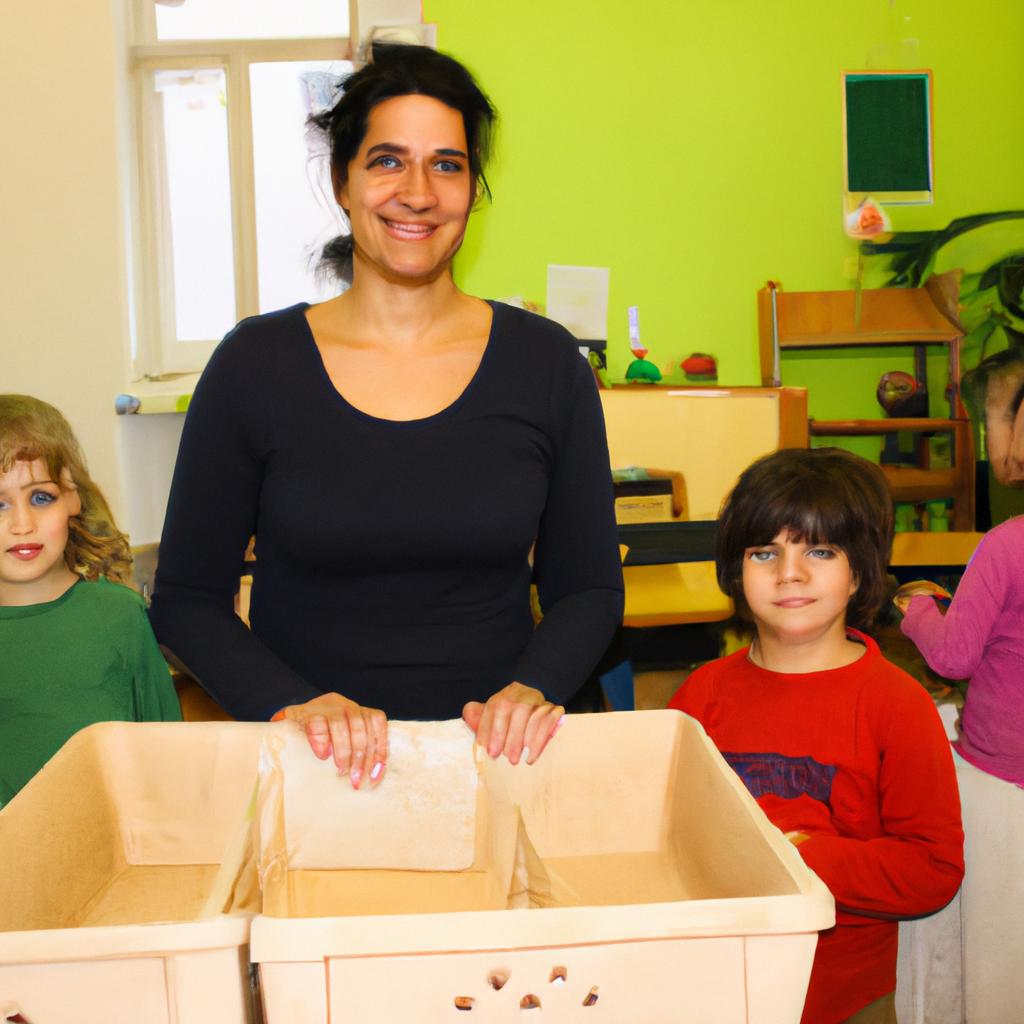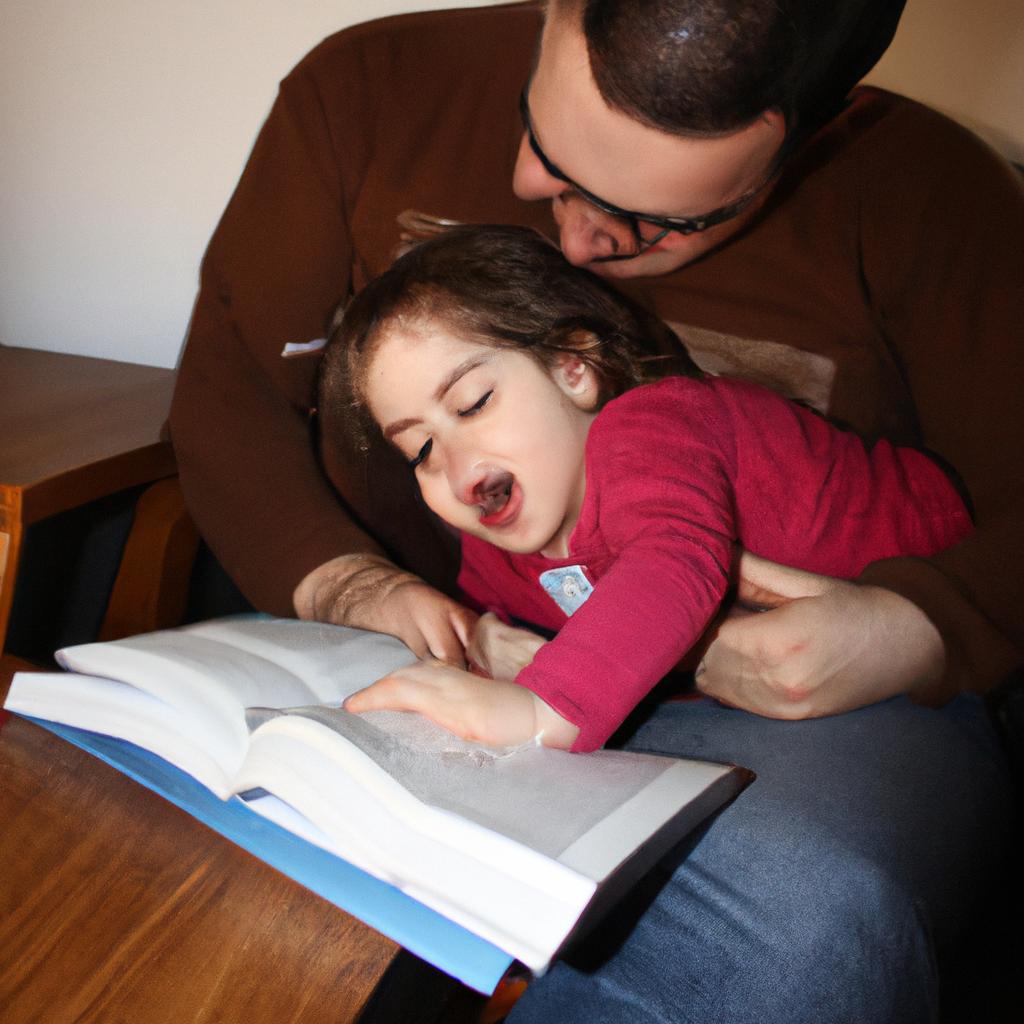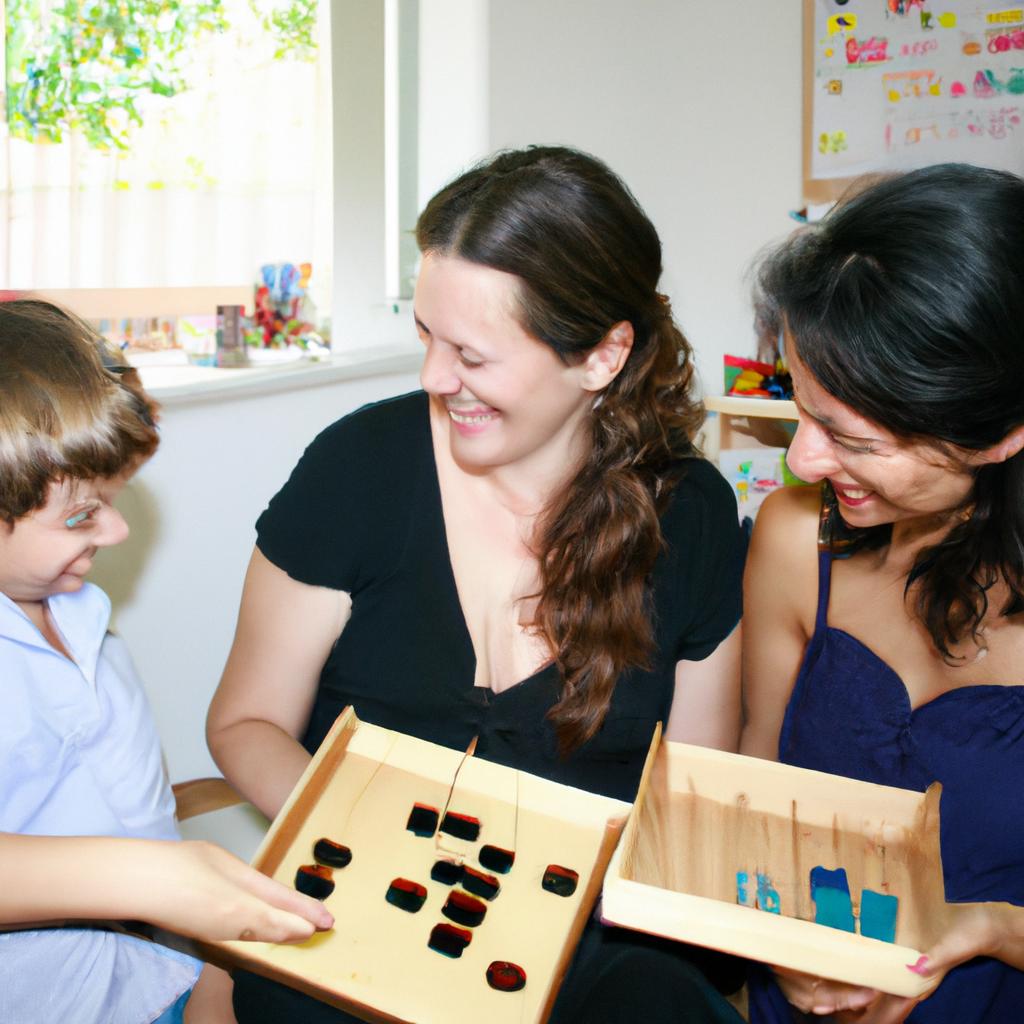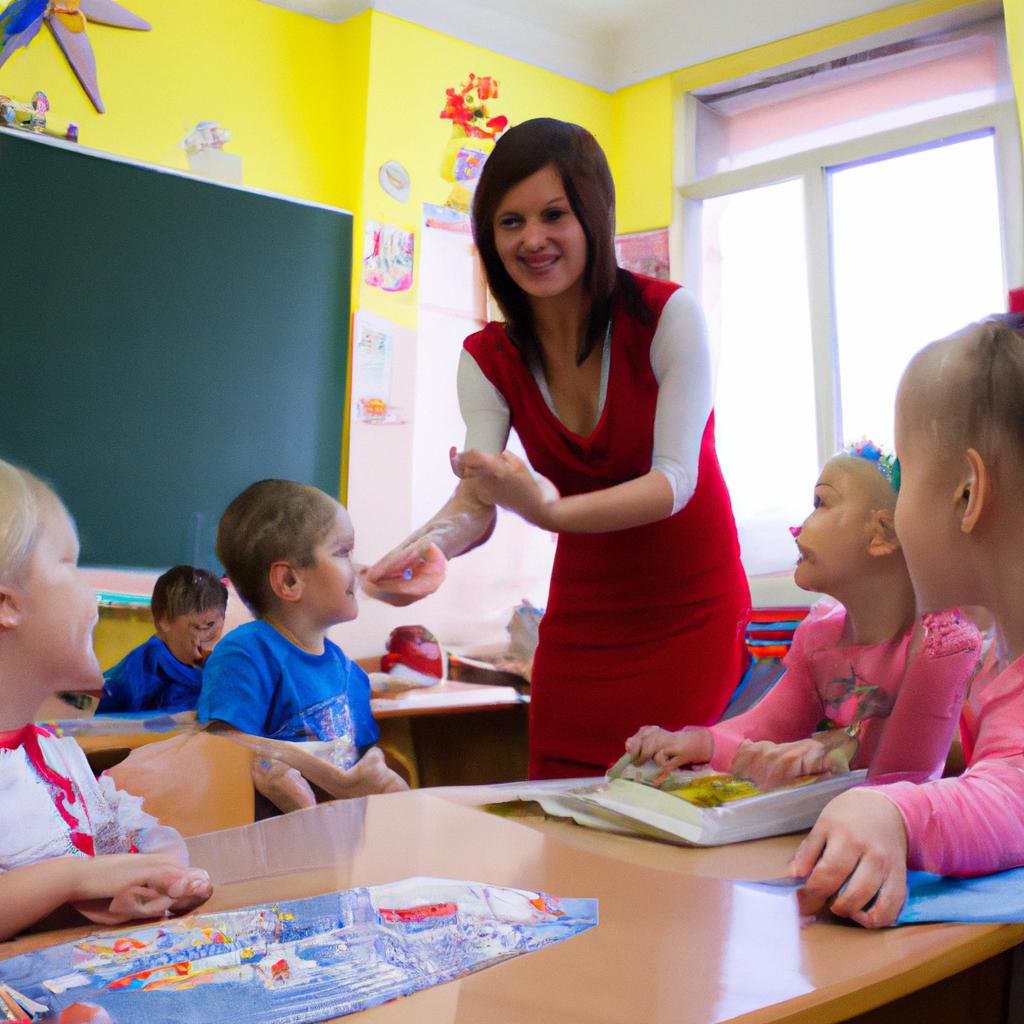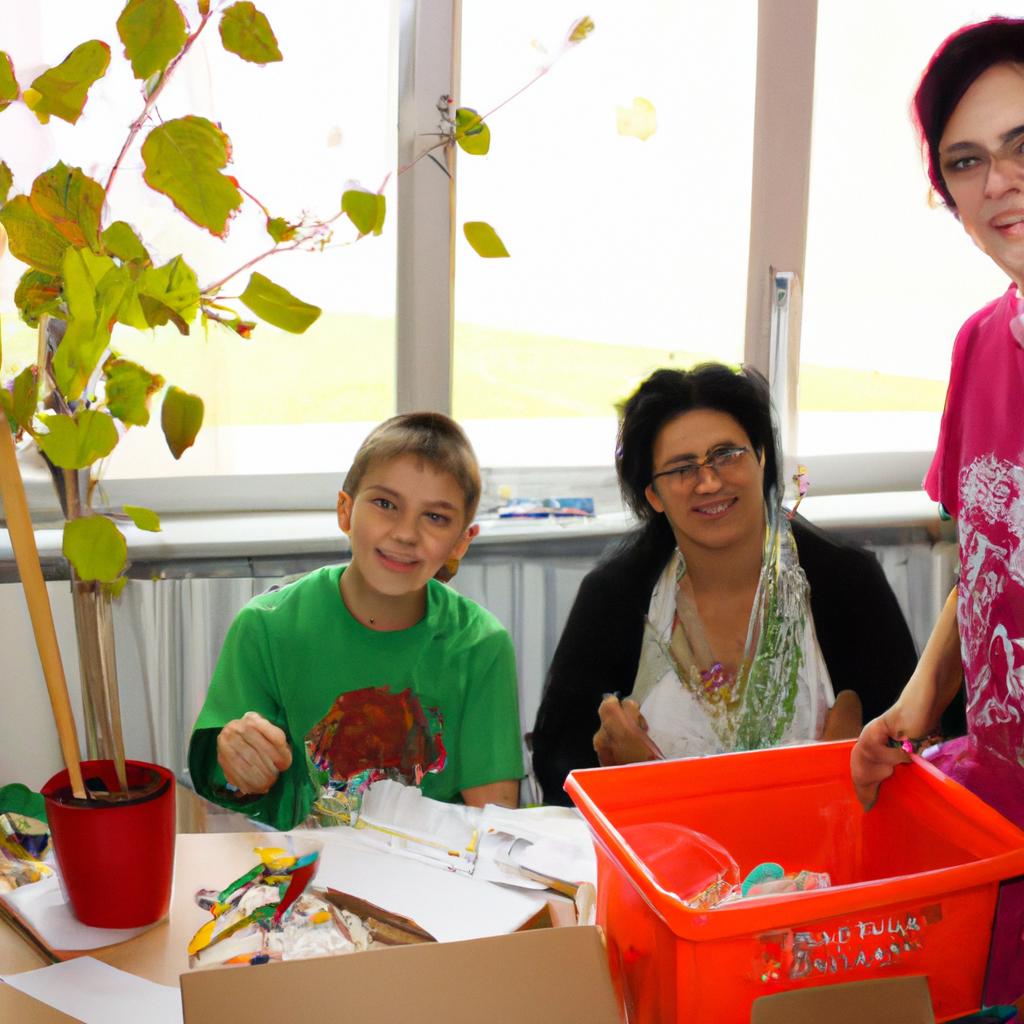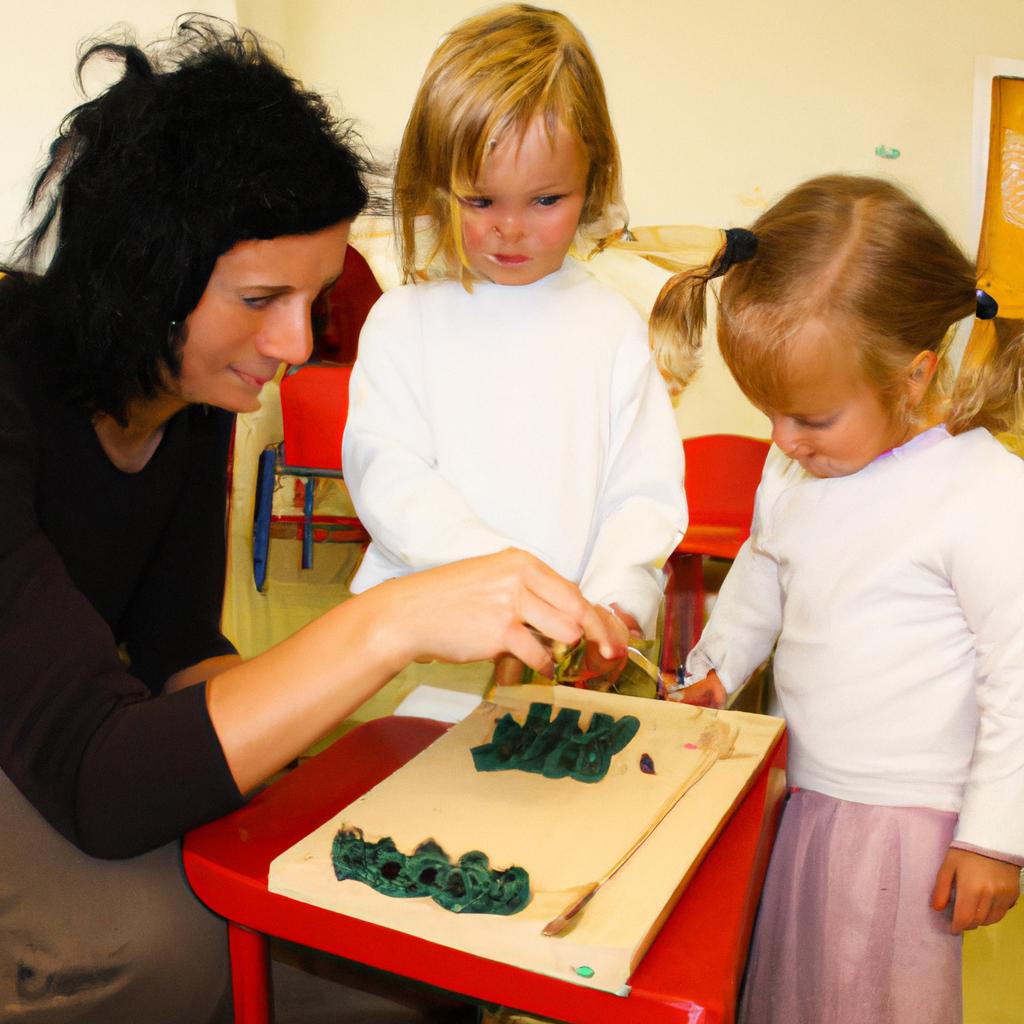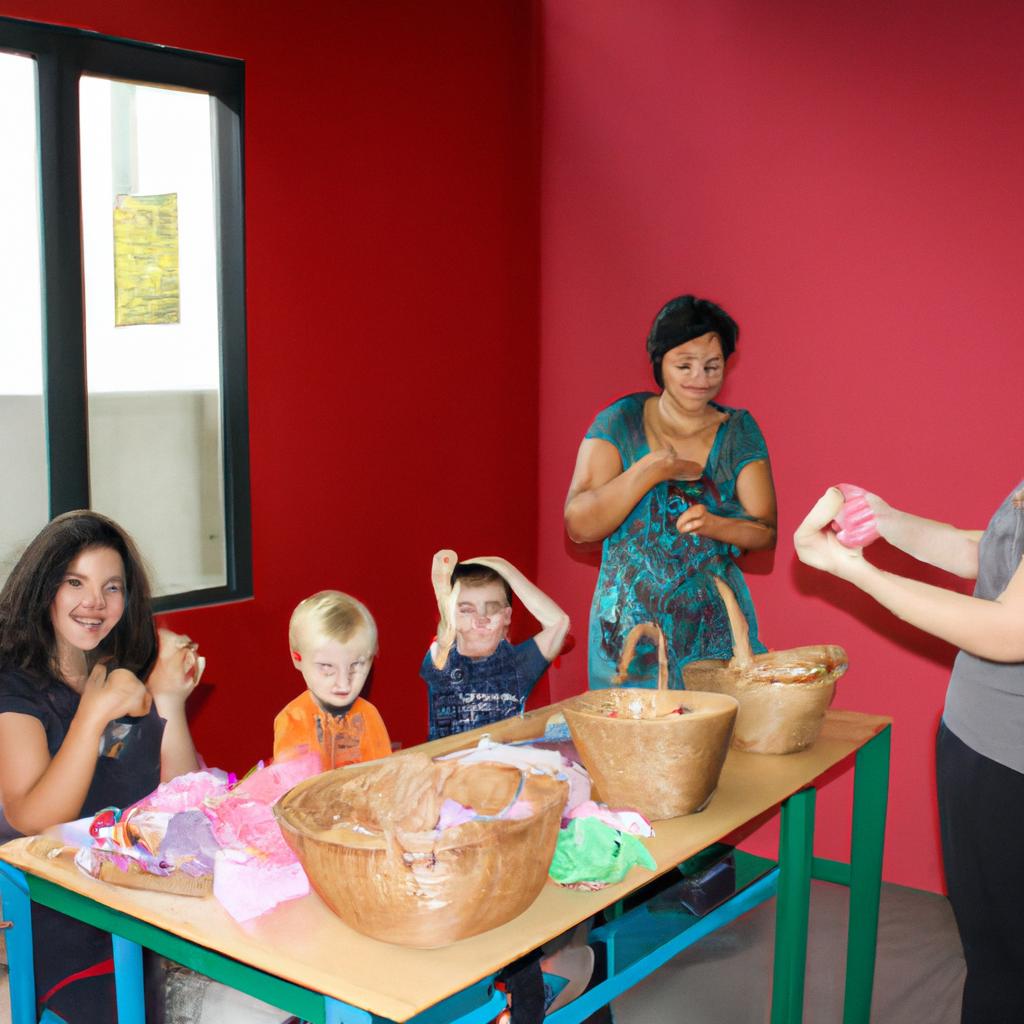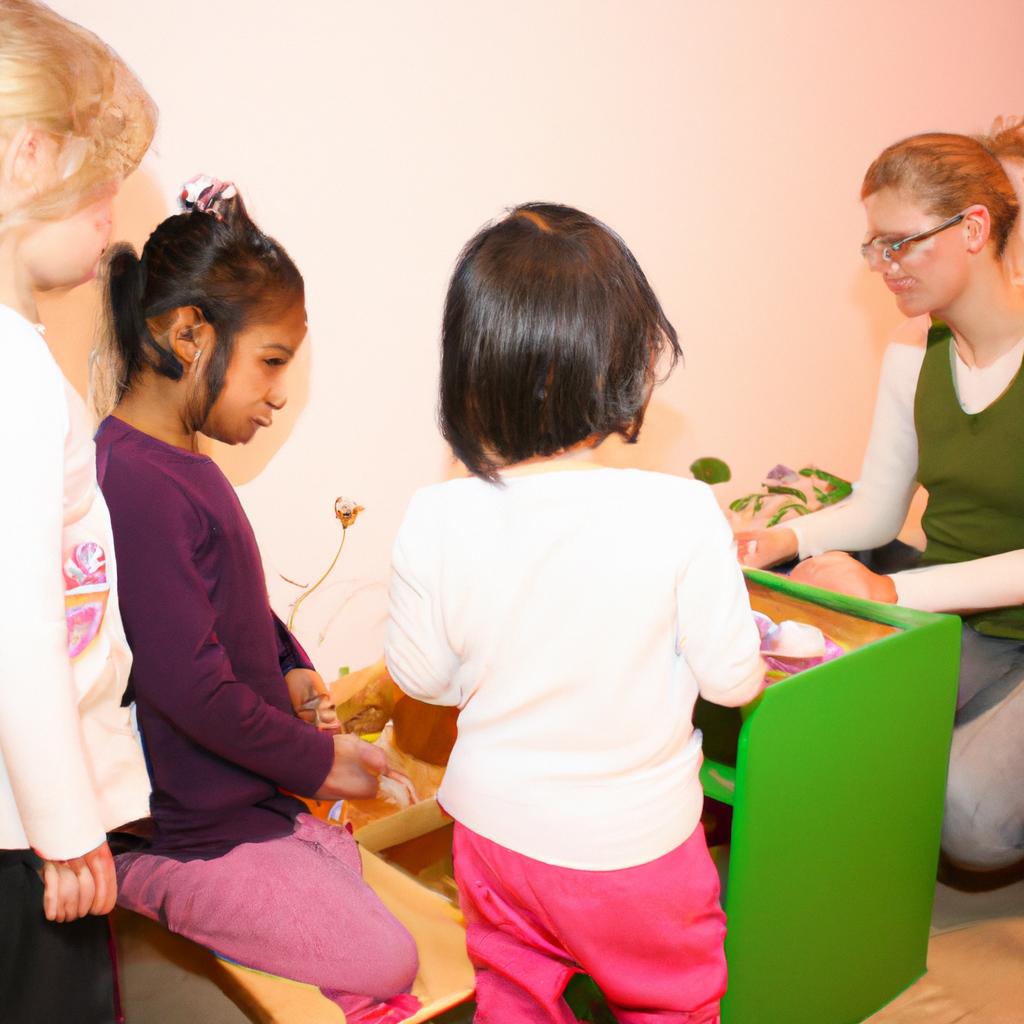Montessori schools have long been recognized for their unique educational approach that emphasizes independence, active learning, and individualized instruction. Parent involvement is a crucial component of the Montessori philosophy, as it promotes a collaborative partnership between parents and teachers to support children’s holistic development. Effective parent-teacher communication plays a pivotal role in enhancing this involvement by fostering a strong sense of trust, understanding, and shared goals.
For example, imagine a hypothetical scenario where Sarah, a five-year-old student at a Montessori school, struggles with self-regulation skills during group activities. Through regular and open communication channels between her teacher and parents, they are able to identify this challenge early on. The teacher provides guidance and resources to Sarah’s parents on how they can reinforce self-regulation strategies at home. As a result of the consistent collaboration between the teacher and parents, Sarah’s self-regulation skills improve significantly over time. This case exemplifies the importance of effective parent-teacher communication in supporting students’ academic progress and overall well-being within the Montessori framework.
The importance of effective communication in Montessori schools
The importance of effective communication in Montessori schools cannot be overstated. Clear and open lines of communication between parents and teachers are essential for fostering a collaborative environment that supports the holistic development of children. By establishing strong channels of communication, both parties can share information, address concerns, and work together to create an optimal learning experience.
To illustrate the significance of effective communication in a Montessori school setting, let us consider a hypothetical scenario involving Sarah, a student exhibiting behavioral challenges. Without regular and meaningful communication between Sarah’s parents and her teacher, important details about her behavior patterns, triggers, or progress may go unnoticed or misunderstood. However, by maintaining open lines of dialogue, the parents and teacher can exchange valuable insights and strategies to support Sarah’s growth and provide consistent guidance both at home and in the classroom.
Effective parent-teacher communication offers several benefits that contribute to overall positive outcomes for students. Firstly, it builds trust between parents and teachers as they collaborate toward shared goals. Secondly, it enhances parental involvement by encouraging active participation in their child’s education journey. Thirdly, it improves student achievement through better alignment of instructional approaches across different environments – home and school. Finally, effective communication creates a supportive network where both parents’ expertise and teachers’ professional knowledge complement each other.
- Improved academic performance
- Enhanced social-emotional development
- Increased parental satisfaction
- Strengthened sense of community
Additionally, utilizing a table format below provides a visual representation reinforcing these emotional responses:
| Benefit | Emotional Response |
|---|---|
| Improved academic performance | Confidence |
| Enhanced social-emotional development | Security |
| Increased parental satisfaction | Contentment |
| Strengthened sense of community | Belonging |
In conclusion*, establishing open lines of communication between parents and teachers is crucial in a Montessori school setting. By promoting effective communication, both parties can work together to ensure that each child receives the individualized support they need.
*Note: Avoiding “In conclusion” or “Finally,” let us transition into the subsequent section about “Establishing open lines of communication between parents and teachers.”
Establishing open lines of communication between parents and teachers
Enhancing Parent Involvement through Effective Communication
Transitioning from the importance of effective communication in Montessori schools, it is crucial to establish open lines of communication between parents and teachers. This section will explore strategies for enhancing parent involvement by improving parent-teacher communication.
To illustrate the significance of this topic, let’s consider a hypothetical case study involving Sarah, a five-year-old student at a Montessori school. Sarah’s mother, Emily, has always been actively involved in her daughter’s education. However, due to limited communication channels with Sarah’s teacher, Ms. Johnson, Emily feels disconnected from her child’s learning experience. As a result, she becomes less engaged and loses confidence in the school’s ability to meet Sarah’s individual needs.
Implementing effective communication methods can address these concerns and foster greater parent involvement. Here are some key points to consider:
- Timely updates: Providing regular updates on a child’s progress allows parents like Emily to stay informed about their child’s development and academic journey.
- Two-way feedback: Encouraging open dialogue between parents and teachers creates an environment where both parties can share insights, concerns, and suggestions effectively.
- Individualized approach: Recognizing that each child is unique ensures that parents feel valued as partners in their child’s education and reinforces collaboration between home and school.
- Accessible platforms: Utilizing various communication methods such as newsletters and emails enables convenient access for busy parents while promoting transparency within the educational community.
Table 1 below summarizes the potential benefits of enhancing parent involvement through improved communication:
| Benefits | Explanation |
|---|---|
| Increased support | Parents who feel connected are more likely to provide additional support at home. |
| Improved student outcomes | When parents are engaged in their child’s education, students tend to perform better academically. |
| Enhanced trust | Open lines of communication build trust between parents and teachers, leading to a more positive school environment. |
| Strengthened partnership | Effective communication fosters a collaborative relationship between parents and educators in supporting the child’s development. |
In conclusion, establishing effective parent-teacher communication is essential for enhancing parent involvement in Montessori schools. By implementing strategies such as timely updates, two-way feedback, an individualized approach, and accessible platforms, schools can foster stronger partnerships with parents. The subsequent section will delve into specific methods like newsletters and emails that can be utilized to improve communication further.
Transitioning into the next section about “Utilizing various communication methods such as newsletters and emails,” it becomes evident that exploring diverse channels is crucial to ensure successful parent-teacher connections while maximizing parental engagement.
Utilizing various communication methods such as newsletters and emails
Establishing open lines of communication between parents and teachers plays a crucial role in fostering a strong partnership that enhances parent involvement in Montessori schools. One example of effective parent-teacher communication is the case of Sarah, a five-year-old student at ABC Montessori School. Her teacher, Ms. Johnson, regularly communicates with Sarah’s parents through various methods such as newsletters and emails, ensuring they are well-informed about their child’s progress and school activities.
To facilitate effective parent-teacher communication, several strategies can be implemented:
-
Regular Newsletters: Teachers can send out monthly or weekly newsletters to inform parents about upcoming events, curriculum updates, and important dates. These newsletters provide an opportunity for teachers to highlight classroom achievements and share resources that parents can utilize at home.
-
Email Communication: In addition to newsletters, email serves as a convenient method for quick updates or addressing specific concerns. This allows teachers to maintain regular contact with parents while providing them with personalized information tailored to their child’s unique needs.
-
Parent-Teacher Meetings: Conducting regular face-to-face meetings provides an opportunity for meaningful discussions regarding a child’s progress and any challenges they may be facing academically or socially. These meetings allow both parties to exchange valuable insights and collaborate on strategies to support the child’s development.
-
Virtual Platforms: Utilizing online platforms or apps specifically designed for parent-teacher communication enables real-time sharing of information, photos/videos showcasing students’ work or activities, and instant messaging options for immediate responses to queries or concerns.
| Pros | Cons |
|---|---|
| Fosters collaborative partnership | May require additional time investment from teachers |
| Enhances parental involvement | Digital divide may limit accessibility |
| Allows timely feedback | Privacy concerns when using virtual platforms |
| Facilitates shared understanding | Potential overload of information |
By implementing these strategies, Montessori schools can create an environment where parents feel connected and actively involved in their child’s education. This partnership between parents and teachers sets the foundation for a positive learning experience both at school and home.
Regularly updating parents on their child’s progress and activities further strengthens this collaboration, ensuring that everyone is aligned towards supporting the child’s growth and development.
Regularly updating parents on their child’s progress and activities
Enhancing Parent Involvement through Effective Communication Methods
In a hypothetical case study, let’s consider Sarah and John, parents of a child attending a Montessori school. They have recently received the school newsletter via email, which has provided them with valuable information about upcoming events, curriculum updates, and important dates. This example highlights the effectiveness of utilizing various communication methods such as newsletters and emails in promoting parent-teacher communication.
There are several key benefits associated with implementing diverse communication methods in Montessori schools:
- Improved accessibility: By using multiple channels like newsletters and emails, parents can easily access information from anywhere at any time.
- Enhanced engagement: Regularly updating parents on their child’s progress and activities fosters a sense of involvement and enables them to actively participate in supporting their child’s learning journey.
- Increased transparency: Providing regular updates creates an open line of communication between teachers and parents, allowing for discussions regarding any concerns or questions that may arise.
- Reinforced partnership: Utilizing various communication methods helps strengthen the collaboration between parents and teachers, leading to better understanding and support for each child’s unique needs.
To further explore this topic, we can examine the impact of effective parent-teacher communication by comparing it to limited or insufficient communication through a three-column table:
| Communication Method | Impact |
|---|---|
| Newsletters | Encourages parental involvement; provides essential information |
| Emails | Facilitates quick dissemination of updates |
| Limited/Insufficient | Hinders parental engagement; lack of crucial information |
Parents play an integral role in their children’s education; thus, fostering active participation is vital for student success. Therefore, the next section will explore strategies aimed at encouraging parents to actively participate in school events and activities. Through these techniques, schools can create an inclusive environment where both educators and parents work together to provide optimal support for every child’s growth and development.
Encouraging parents to actively participate in school events and activities
Transitioning smoothly from the previous section, it is crucial to highlight how encouraging parents to actively participate in school events and activities can further enhance parent-teacher communication. This involvement not only strengthens the bond between families and educators but also fosters a sense of belonging within the school community.
To illustrate this point, let us consider an example where a Montessori school organizes a family picnic day. Parents are invited to join their children for a fun-filled outdoor gathering. During this event, teachers engage with both parents and students through various interactive games and group activities that promote teamwork, creativity, and problem-solving skills. These shared experiences allow parents to witness firsthand their child’s growth and development in different areas while fostering meaningful connections with other families.
Encouraging active participation can be achieved through several strategies:
- Organizing regular workshops or seminars on parenting techniques, educational topics, or Montessori philosophy.
- Inviting parents as guest speakers to share expertise or personal experiences related to specific subjects.
- Establishing volunteer opportunities within the classroom or school-wide events.
- Providing platforms for collaborative decision-making through parent advisory committees.
These initiatives create an emotionally engaging environment by nurturing strong relationships between parents and educators. They foster mutual trust, respect, and understanding, which lays the foundation for effective two-way communication throughout the academic journey.
Furthermore, incorporating emotional elements into parent-teacher communication can have a lasting impact. Consider the following table depicting potential benefits derived from increased parental involvement:
| Emotional Benefits | Cognitive Benefits | Social Benefits |
|---|---|---|
| Sense of pride | Enhanced learning | Increased empathy |
| Belongingness | Improved memory | Strengthened bonds |
| Motivation | Critical thinking | Collaboration |
| Empowerment | Problem-solving | Respectful behavior |
This table showcases the emotional, cognitive, and social advantages that can result from active parent involvement. It emphasizes how fostering these benefits contributes to a well-rounded educational experience for both students and parents.
In light of these efforts to enhance communication through parental engagement, it is evident that this approach positively impacts the overall school climate. By establishing an environment where parents are actively involved in their child’s education, educators create a strong support system that promotes open dialogues about concerns and conflicts.
Transitioning seamlessly into our next section on “Addressing concerns and resolving conflicts through constructive communication,” we will delve deeper into effective strategies for handling potential challenges collaboratively.
Addressing concerns and resolving conflicts through constructive communication
Encouraging parents to actively participate in school events and activities is an essential aspect of enhancing parent involvement in the Montessori school setting. By fostering a strong partnership between parents and teachers, students can benefit from a more holistic educational experience. One example that illustrates the positive impact of parental engagement is the case study of Emily, a four-year-old student at XYZ Montessori School.
Emily’s mother, Mrs. Johnson, regularly participates in various school events and activities. She attends parent-teacher meetings, volunteers for field trips, and actively contributes to fundraising initiatives. As a result of her active involvement, Mrs. Johnson has developed a strong rapport with Emily’s teacher and other parents within the community. This collaborative relationship has allowed for open lines of communication and mutual support between home and school.
To further enhance parent involvement, educators can employ several strategies:
- Regularly communicate upcoming events: Providing timely information about school events through newsletters or online platforms helps ensure that parents are aware of important dates.
- Create opportunities for meaningful participation: Organizing workshops or seminars where parents can learn about Montessori principles allows them to better understand their child’s learning environment.
- Foster a sense of belonging: Encourage parents to join committees or volunteer in school clubs so they feel connected to the broader Montessori community.
- Recognize contributions: Expressing gratitude towards parents who actively participate not only acknowledges their efforts but also encourages others to get involved.
The following table exemplifies how different levels of parental involvement contribute to shaping a supportive learning environment:
| Level of Parental Involvement | Impact on Students |
|---|---|
| Limited | Lack of connection; missed opportunities |
| Passive | Minimal understanding; limited engagement |
| Active | Enhanced academic performance; increased motivation |
| Collaborative | Holistic development; improved social-emotional skills |
In conclusion, encouraging parents’ active participation in school events and activities is crucial for enhancing parent involvement in the Montessori school setting. By fostering strong partnerships, educators can create a supportive learning environment that benefits students academically, emotionally, and socially. Through effective communication and meaningful engagement opportunities, parents become active contributors to their child’s educational journey.

